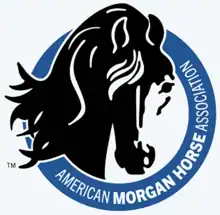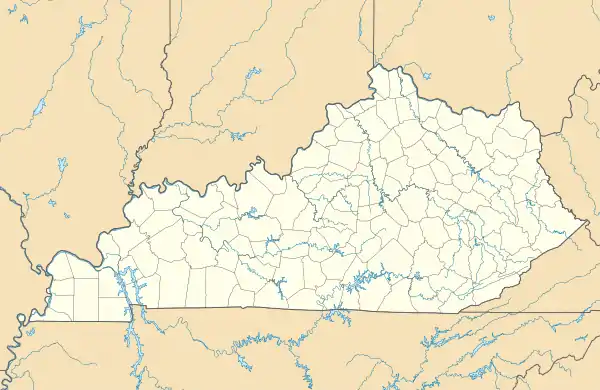 | |
 Location within Kentucky  American Morgan Horse Association (the United States) | |
| Abbreviation | AMHA |
|---|---|
| Predecessor | Morgan Horse Club |
| Formation | 1909 |
| Purpose | Register and promote Morgan horses |
| Headquarters | 4037 Iron Works Parkway, Suite 130, Lexington, Kentucky 40511 |
| Coordinates | 38°08′50″N 84°30′55″W / 38.14709713445013°N 84.51529330483591°W |
| Services | Breed registry |
| Publication | The Morgan Horse[1] |
| Affiliations | USDF, USEF, WDAA, 50 recognized clubs, 20 youth clubs |
| Website | morganhorse |
The American Morgan Horse Association (AMHA) is a horse breed registry for the Morgan horse, founded in 1909, and is a membership and service organization for Morgan horse breeders and owners. Its offices are located at the Kentucky Horse Park in Lexington, Kentucky. AMHA has published the print magazine The Morgan Horse since 1941, operates a museum in Maine, and offers a variety of public information and educational services.[1]
History
The Morgan Horse Club was founded in 1909 at the 1909 Vermont State Fair,[2] and incorporated as a membership corporation in 1927.[1] In 1971 it was renamed the American Morgan Horse Association.[3][2][1]
In 1988, AMHA constructed a complex in Shelburne, Vermont, called the Morgan Horse Complex, which housed the National Museum of the Morgan Horse (NMMH), the American Morgan Horse Association (AMHA), and the American Morgan Horse Institute (AMHI).[1][4]
In 2020 it moved its offices to the Kentucky Horse Park in Lexington, Kentucky. It has grown to include about 7,000 active members and 90,000 living registered horses.[3]
Breed registry
The first recordings of Morgan horse pedigrees were by Joseph Battell who published The Morgan Horse and Register in 1894,[5][6]. Battell's early books were incorporated into the stud books of the AMHA who maintain them today.[7][8] In 2013, AMHA provided their pedigree archives to the University of Massachusetts Amherst for research purposes.[1] By 2010, the registry had recorded more than 179,000 Morgan horses.[9]
In 1948 the registry closed the stud book to preserve the type, and set up reciprocal agreements with the Canadian Morgan Horse Association in 1985 and the British Morgan Horse Society in 1990.[2][10] Only purebred Morgan horses with two registered parents can be registered with the AMHA; half Morgans cannot be registered. Horses already registered with the British Morgan Horse Society, Swedish Morgan Horse Association, or Canadian Morgan Horse Association are eligible for AMHA registration. Cloned horses may not be registered with the AMHA, but foals resulting from embryo transfer may be.[11]
National Museum of the Morgan Horse
National Museum of the Morgan Horse is located at Pineland Farms Equestrian Center in New Gloucester, Maine. It maintains exhibits on the historical role of the Morgan horse, maintains a research library and a broad collection of artifacts. The purpose of NMMH is to maintain and preserve the history of the Morgan breed through archives and education. NMMH holds the library of the AMHA registry volumes, manuscripts, a complete collection of the breed's official publication The Morgan Horse, an extensive collection of individual Morgan horse photographs, sculptures and paintings, information about Morgan farms and breeders, and club and breed-related organizations.[4][12][13][14]
American Morgan Horse Institute
The American Morgan Horse Institute provides funding for educational projects, scholarships, and conducts the Grand National Morgan Horse Show annually.[4]
Competitions
Morgan horses registered with the AMHA are eligible to compete in events sanctioned by the United States Equestrian Federation, which holds all purebred Morgan shows in the United States. The AMHA also partners with the American Horse Council, the American Driving Society, the United States Dressage Federation, and the Western Dressage Association of America. There are ten sanctioned regional shows held annually, and the largest Morgan horse show, the Grand National and World Championship Morgan Horse Show, is held annually in Oklahoma City.[15]
See also
References
- 1 2 3 4 5 6 "American Morgan Horse Association Registry Records & Background on American Morgan Horse Association". University of Massachusetts Amherst. Retrieved November 19, 2023.
- 1 2 3 Lynghaug, F. (2009). The Complete Official North American Horse Breed Associations' Standards Guide. Minneapolis: Voyageur Press. pp. 207, 222. ISBN 978-0-7603-3499-7.
- 1 2 "Who We Are". American Morgan Horse Association. Retrieved November 18, 2023.
- 1 2 3 "Morgan Horses in American History". Morgan Horse Guide. March 9, 2016. Retrieved November 19, 2023.
- ↑ Gustin, Amanda Kay (2017). "Joseph Battell and the Morgan Horse" (PDF). Vermont magazine. Vol. 29, no. 1. p. 70-77. Retrieved November 19, 2023.
- ↑ UVM Morgan Horse Farm (June 9, 2020). University of Vermont Morgan Horse Farm- Living History. Retrieved November 19, 2023.
- ↑ Hopkin, Rachel. "Why is OKC central to the Morgan horse world?". KGOU. Retrieved November 19, 2023.
- ↑ Piper, Dale. "Love Horses? Visit the Famous Morgan Horse Farm at University of Vermont". The Heart of New England. Retrieved November 19, 2023.
- ↑ "Breeds - Morgan - Breed Characteristics". United States Equestrian Federation. Archived from the original on June 12, 2012. Retrieved November 19, 2023.
- ↑ Curler, Elizabeth A. "History of the American Morgan Horse Register: 1894-1994 - AMHA". Archived from the original on September 13, 2012. Retrieved November 19, 2023.
- ↑ "FAQs - About the Morgan". American Morgan Horse Association.
- ↑ Pineland Farms (October 12, 2022). National Museum of the Morgan Horse. Retrieved November 19, 2023.
- ↑ "National Museum of the Morgan Horse Collections". American Morgan Horse Association. Retrieved November 19, 2023.
- ↑ "The 1997 Carriage Association Conference - Shelburne Farms, VT". The Carriage Journal. Vol. 35, no. 2. Fall 1997. pp. 51–56.
- ↑ "Discipline Collegues". American Morgan Horse Association. Archived from the original on July 16, 2013.